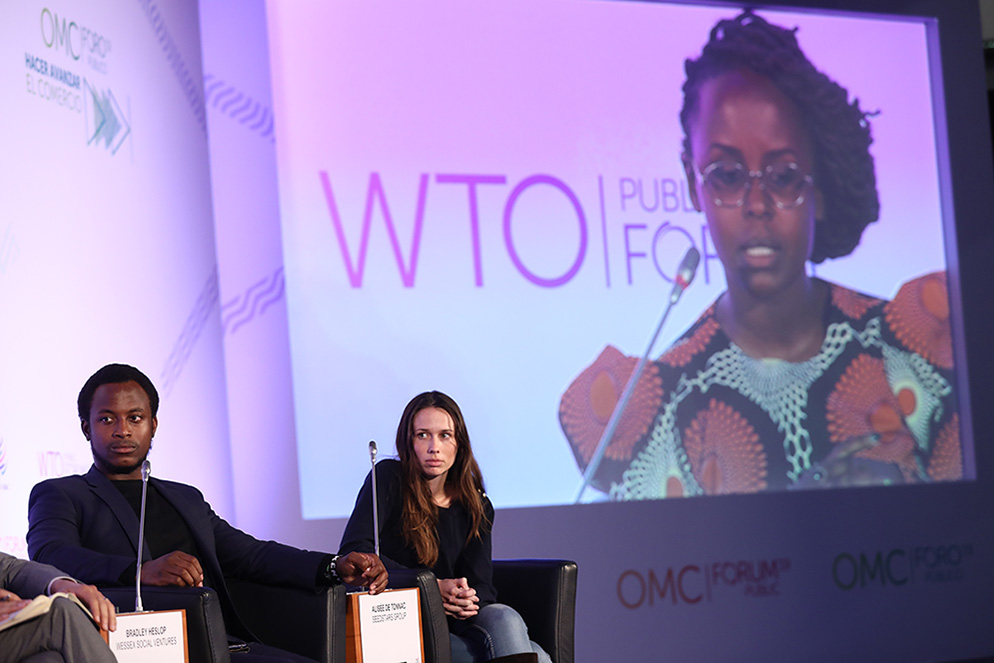More
It was the first time the Public Forum has dedicated a high-level panel completely focused on youth, at a time when Millennials and Generation Z account for two-thirds of the global workforce and will represent over half of the world's population by 2020. This cohort of consumers, entrepreneurs, workers and leaders are “the first to come of age in this era of rapid technological change and what they think about how trade should be evolving needs to be heard,” DG Azevêdo said.
“The theme of the conference is how we need to adapt to the trading environment of 2030, 2040 and 2050, and the Millennials and Generation Z are the ones who are going to be trading, who are going to be benefiting from trading and who potentially will be struggling to participate and benefit from the global trade environment,” DG Azevêdo said. “What the environment is going to be at that point in time is potentially contingent on the decisions we make today … so it's important that we hear from them.”
DG Azevêdo noted that the WTO is in listening mode to learn what young people are proposing with regards to basic societal needs such as the preservation of the environment, education and community engagement. He expressed concern about the high rate of failure for start-ups, generally created by young people, and said it is time traditional and big business follow young entrepreneurs in understanding that they need to be not only profitable but more generous, fair and equitable.
One of the major challenges the WTO faces today, he added, is inclusivity — how rules can be simplified so that start-ups and micro, small and medium enterprises (MSMEs) around the world can reap the benefits of international trade.
Panelists discussed how they believe global trade can reflect their values and address the challenges facing young people as a result of the changing economic landscape, which includes new employment patterns, education and skills mismatch, environmental concerns, and the continuing imperative of poverty reduction. They asked for a joint effort by multilateral organizations like the WTO to create favorable conditions for new start-ups and new opportunities for young people to launch their own business ventures which will result in job creation.
Chebet Lesan, CEO of BrightGreen Energy, a company that works to create modern eco-friendly heating fuels in Africa, said that in the current environment “it is very difficult as a young person to be strategic,” as planning for the future clashes with structural impediments, particularly in terms of investment. “We have the passion but if we want to attract investment, we have a big problem because we do not have financial muscle nor political influence,” she said.
Bradly Heslop, co-founder and Managing Director of Africa WSV, a social franchise that helps community-operated social enterprises to support development goals, highlighted the changing paradigm these generations bring. Recent polls indicate that around seven out of ten Millennials and Generation Z want to start their own companies. “The world needs entrepreneurs now, not employees, but the necessary conditions are not provided,” he said.
Alisée de Tonnac, co-founder and partner at Seedstars Group, a group which helps people in emerging markets through technology and entrepreneurship, said the big change with respect to previous generations of entrepreneurs is that money and profit are not everything. “For this generation, profit and purpose go hand in hand. I am not saying we are a better generation but at this time we have no other option,” she declared.
Andrés Escobar, co-founder of IMPCT Coffee, a company sourcing coffee from vulnerable communities which re-invests back through local women to build poverty-reducing education businesses, said it is time for the new generation to take over. He called on the older generation “to really listen to us because sometimes we have great ideas. It is the only way ahead if we are to find proper, accurate and impactful solutions for the challenges that lay ahead.”
In a separate event, the Geneva Hub of the Global Shapers Community organized a workshop on youth's perspective on the future of trade with the idea of bringing to the fore pressing issues that young people care about and that impact the way youth perceive trade. This includes looking at climate change, the impact of new technologies, and how youth can be involved in shaping a better and fairer trading system for everyone.
The Geneva Hub leveraged the network of Global Shapers from across the world to reflect diversity in the voice of the youth and came up with a series of recommended actions in order to change the perception of young people that they are not being heard in trade negotiations and policy making in general, and what the WTO could do to change that.
They called on the WTO to empower youth, taking into account that two-thirds of young people perceive the current system of international trade as negatively affecting climate change, seeing it as a driver, in its current form, of an unequal playing field for developing countries.
Share
Share
Problems viewing this page? If so, please contact [email protected] giving details of the operating system and web browser you are using.
